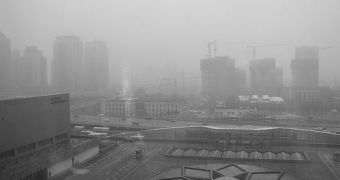Carbon dioxide is the main chemical element that influences global warming, in that it virtually "traps" heat moving away from the surface of the planet and redirects it downwards, creating a greenhouse effect of sorts. And since this has been common knowledge for some time now, scientists have always agreed that the only way to stop the global temperature from rising is to cut back on carbon emissions worldwide. But that could be a mistake, says a German scientist studying heating patterns.
Hans-Joachim Schellnhuber, director of the Potsdam Institute for Climate Research, in Potsdam, Germany, argues that other aerosol particles besides carbon, known as aerosols, actually have a cooling effect on the surface of the planet and help keep temperatures low. The main problem with global warming is that, while aerosols do their job, carbon tends the "insulate" our atmosphere and keep all the heat in. Schellnhuber says that a significant drop in aerosol levels could mean a very quick rise in Earth's overall temperature, with the cooling effect gone.
Major cities such as New York, Delhi and Beijing, which are responsible for the largest amounts of carbon dioxide dissipated into the air, need to reduce their respective outputs by cutting back on cars and power-plants, the main source of carbon. That is to say, they should employ more effective means of achieving the same tasks, so as to replace fossil fuel with renewable power sources.
The German scientist says that, in order for the temperature to decrease, carbon levels need to be reduced by more than 50 percent, before the aerosols could be eliminated as well. The fact is that, left alone, carbon will generate enormous amounts of heat, by trapping even more warmth from the Sun inside the atmosphere, while aerosols, which currently act like a fan, will remain static. Continuous carbon output means that mankind "is closing the last door we have through which we can possibly influence the global climate", said Schellnhuber.

 14 DAY TRIAL //
14 DAY TRIAL //